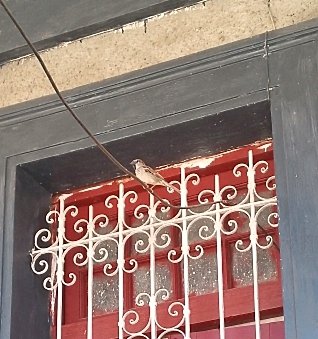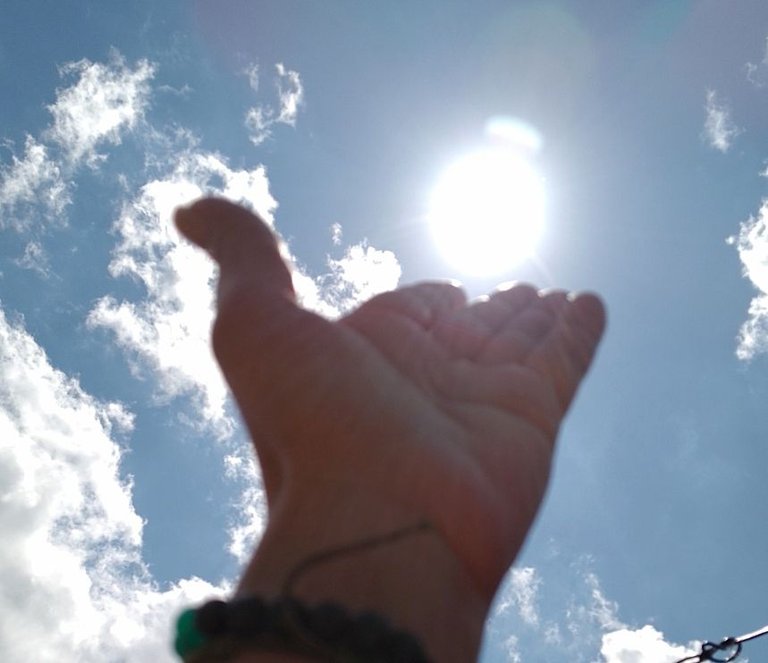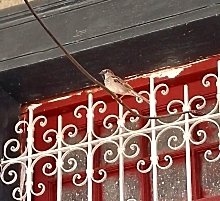
Es la superstición un tema sobre el cual no me había detenido a reflexionar. Antes de leer varias de las participaciones dentro de la iniciativa que @lilianajimenez nos propusiera, me consideraba una mujer para nada supersticiosa. Pero entonces me detuve, y tras un momento de introspección, me he dado cuenta de que en realidad nadie escapa a las supersticiones en mayor o menor medida.
Según el Diccionario de la RAE, la raíz etimológica superstitio, en su primera acepción, habla de ideas irracionales a la fe, en sentido religioso; una segunda perspectiva la presenta como ese aprecio o miedo a las cosas ocultas o misteriosas y en un tercer aspecto indica a la superstición como esa creencia en lo sobrenatural que atribuye poderes a objetos o eventos que en realidad no los tienen.

Puede que no sienta el peso del ocultismo en mi vida pues mi fe está orientada en los preceptos bíblicos que considero verdades absolutas, pero para llegar a esa convicción he transitado por un camino que, de vez en cuando, rozó elementos de la superstición y bien se comprenden desde la tercera acepción etimológica de la RAE.
Mi herencia ancestral también me ha inculcado cierto respeto o cuidado por preservar rituales que son tradición en la familia. Vi como mi bisabuela quitaba el mal de ojo con la lectura de la Oración a San Luis Beltrán aunque nunca mis hijos usaron el azabache con los ojitos de Santa Lucía en sus ropitas de bebé; o como mi abuelo paterno, el centenario, cuidó sus días exigiendo que nadie pusiera su sombrero encima de la cama pues le anunciaban ruina o muerte; también vi los vasos de agua y los tabacos en alto junto a las flores blancas para clarificar el espíritu de los difuntos familiares, cómo mi madre espantaba las moscas grandes y ponía una escoba con sal detrás de la puerta para no recibir visitas indeseables o leía en el color del cielo las tormentas.
Todas esas y otras prácticas modelaron en la familia ciertas tradiciones y yo las respeté, hasta me parecían sucesos pintorescos con los cuales fabulaba secretamente, como secretamente he amado esas notas de “realismo mágico” , así las sentía y las viví.

Era muy niña y me gustaba creer que era cierto que el tatarabuelo venía de noche sin que nadie lo viera desde la otra vida a beberse el ron o a fumar del tabaco que la hija le ofrecía como homenaje o que los bebés que lloraban encontraban calma con la señal de la cruz tres veces sobre la frente; era la forma más sencilla que encontré de explicarme el mundo como mismo lo hizo el hombre antiguo en sus múltiples lecturas mágicas.
Sin embargo, con el paso del tiempo dejé los ritos familiares y he comprendido, tras leer el post de la amiga @charjaim, que yo misma me he inventado una superstición personal y que esta me hace feliz. Hoy voy a contarla públicamente por primera vez.

Mi alma y los gorriones
La casa de mis abuelos maternos era una casa antigua, de mampostería y madera con un puntal altísimo. Entre los tabiques, las vigas que soportaban el tablado y las tejas del techo anidaban gorriones. Recuerdo que me encantaba dormir las siestas o pasar la convalecencia de alguna enfermedad típica de la infancia acostada en la cama de los abuelos, escuchando el gorgear de las avecillas que conversaban en su propia lengua.
Me gustaba que me asaltara un tropel de alas pasando a velocidad increíble por mi lado, haciendo entrada por el amplio ventanal del patio interior. Desde siempre me han gustado los gorriones pero a la que no parecían agradarle mucho era a mi abuela, quien maldecía a los “pajarracos” por interrumpirle la paz del descanso y hacerle barrer las migas de pan o los restos de yerba y paja seca de los nidos que caían desde las alturas.
Cuando mi abuela falleció seis años después de mi abuelo, la casa se vendió. De repente me quedé sin abuelos, sin la casa de mis memorias de infancia, mis afectos más profundos... y sin gorriones. Pero entonces sucedió algo insólito: en mi propia casa comenzaron a llegar las aves y hasta las más intrépidas entraban a la cocina en las mañanas.

Uno de lo gorriones, al que le nombré “El Dueño”, solía entrar lentamente y sin miedo, miraba todo alrededor, recorría la cocina y se posaba luego en la ventana sin importarle mi presencia o la de alguien más. Cuando busqué el significado del gorrión como ave me sorprendí pues decía que eran mensajeros de nuestros seres queridos y que simbolizaban la memoria, el deseo de no olvidar.
Entonces me inventé mi propia superstición: esos gorriones eran mis abuelos que de algún modo querían estar presentes, que no les olvide, dejarme mensajes cada día. Así lo he creído y lo quiero creer, porque es un paliativo para la ausencia y porque así siento menos nostalgia de ellos, mis amados.

Como ven, amigos de #holos-lotus, las supersticiones a veces son heredadas, otras construidas sobre nuestras experiencias pues nadie nace con temores o certezas sino que se les van incorporando en el proceso de aprendizaje del mundo. Nuestras necesidades pueden condicionarlas pero como decía la amiga @charjaim quien crea en ellas y se sienta feliz pues que feliz sea.
Gracias a todos por llegar y leerme. Es siempre un placer compartir en esta comunidad aunque les confieso que cada vez que escribo para alguna de las iniciativas maravillosas que lanzan ustedes, mi alma termina estrujada por unos días y no es que sea una sensación incómoda pero me cuesta reponerme de las emociones que me provocan. De igual manera eso se agradece, nos hace estar en sintonía con nuestra naturaleza más sincera.
Hasta otra oportunidad
Les dejo abrazos de luz

Imágenes de mi propiedad. Banners diseñados por mi en Canva


Superstition is a topic I hadn't stopped to reflect on. Before reading several of the entries in the initiative @lilianajimenez proposed to us, I considered myself not at all superstitious. But then I stopped, and after a moment of introspection, I realized that in reality, no one escapes superstitions to a greater or lesser extent.
According to the RAE Dictionary, the etymological root superstitio, in its first meaning, speaks of ideas irrational to faith, in a religious sense; a second perspective presents it as that appreciation or fear of hidden or mysterious things, and a third perspective indicates superstition as that belief in the supernatural that attributes powers to objects or events that don't actually have any.

I may not feel the weight of the occult in my life because my faith is oriented towards biblical precepts that I consider absolute truths, but to reach that conviction I have walked a path that, from time to time, touched on elements of superstition that are well understood from the third etymological meaning of the RAE.
My ancestral heritage has also instilled in me a certain respect for, or care for, preserving rituals that are family traditions. I saw how my great-grandmother removed the evil eye by reading the Prayer to Saint Louis Beltran, although my children never wore the jet with the eyes of Saint Lucy on their baby clothes; or how my paternal grandfather, a centenarian, guarded his days by demanding that no one place their hats on the bed, as they would predict ruin or death. I also saw the glasses of water and cigars held high next to white flowers to bless the spirits of deceased relatives; how my mother shooed away large flies and placed a broom with salt behind the door to ward off unwanted visitors; or how she read storms in the color of the sky.
All these and other practices shaped certain traditions in the family and I respected them and even thought of them as picturesque events with which I secretly fantasized, just as I secretly loved those notes of “magical realism”, that is how I felt and lived them.

As a young girl, I liked to believe it was true that my great-great-grandfather would come back at night, unseen, from the afterlife to drink the rum or smoke the tobacco his daughter offered him as a tribute, or that crying babies would find solace in making the sign of the cross three times on their foreheads. It was the simplest way I found to explain the world to myself, just as ancient man did with his many magical explanations.
However, as time went by, I abandoned family rituals and, after reading my friend @charjaim's post, realized that I had invented a personal superstition, and that it makes me happy. Today, I'm going to share it publicly for the first time.

My Soul and the Sparrows
My maternal grandparents' house was an old house, made of masonry and wood with a very high scaffolding. Sparrows nested among the partitions, the beams that supported the floorboards, and the roof tiles. I remember loving taking naps or convalescing from a typical childhood illness lying in my grandparents' bed, listening to the chirping of the little birds conversing in their own language.
I liked being attacked by a flock of wings flying past me at incredible speed, entering through the large window of the interior patio. I've always liked sparrows, but the one who didn't seem to like them much was my grandmother, who cursed the "big birds" for disturbing her peaceful rest and making her sweep up the breadcrumbs or the remains of grass and dry straw from the nests that fell from above.
When my grandmother died six years after my grandfather, the house was sold. Suddenly, I was left without grandparents, without the house of my childhood memories, my deepest affections... and without sparrows.But then something unusual happened: birds began to arrive at my own house, and even the most intrepid would enter the kitchen in the mornings.

One of the sparrows, which I named "The Owner," would enter slowly and fearlessly, look around, walk around the kitchen, and then land on the window, not caring about my presence or anyone else's. When I looked up the meaning of the sparrow as a bird, I was surprised, because it said they were messengers from our loved ones and that they symbolized memory, the desire not to forget.
So I invented my own superstition: those sparrows were my grandparents, who somehow wanted to be there, to make sure I didn't forget them, to leave me messages every day. And that's what I've believed and want to believe, because it's a palliative for the absence and because it makes me feel less homesick for them, my loved ones.

As you can see, friends of #holos-lotus, superstitions are sometimes inherited, other times they are built on our experiences. No one is born with fears or certainties; they are incorporated into our lives as we learn about the world. Our needs can influence them, but as our friend @charjaim said, whoever believes in them and feels happy, well, let them be happy.
Thank you all for stopping by and reading. It's always a pleasure to share in this community, although I confess that every time I write for one of the wonderful initiatives you launch, my soul ends up crushed for a few days. It's not that it's an uncomfortable feeling, but it's hard for me to recover from the emotions they provoke. That's appreciated anyway; it keeps us in tune with our most sincere nature.
Until another time.
Sending you hugs of light.

Content translated with Google Images are my propperty. Banners made in Canva

I invite you to visit the project DRIP - WITNESS NODE - BPUD

Support the witness and vote for TheBbhProject! Project carried out by @bradleyarrow








